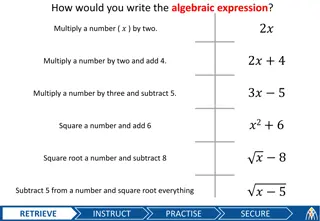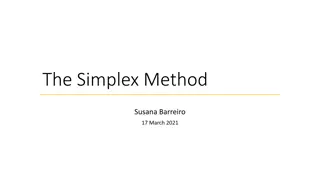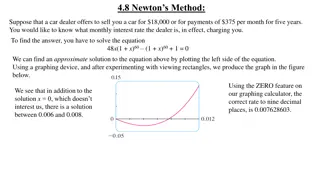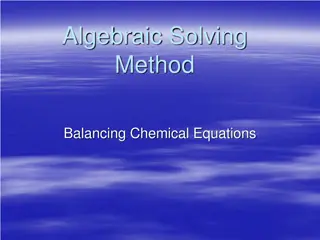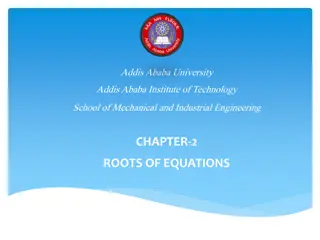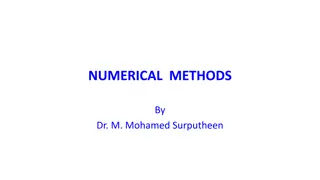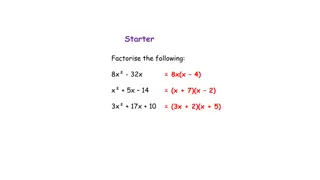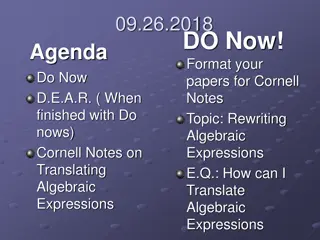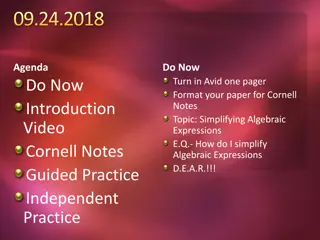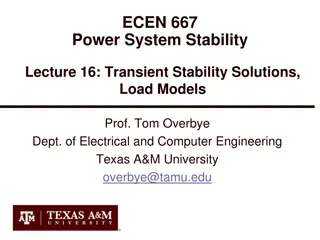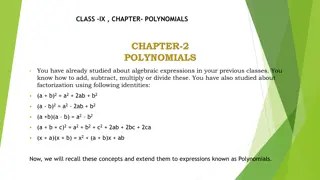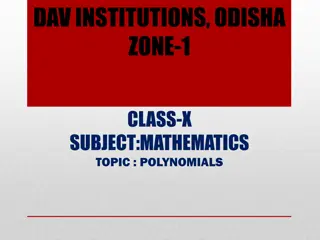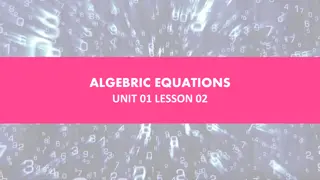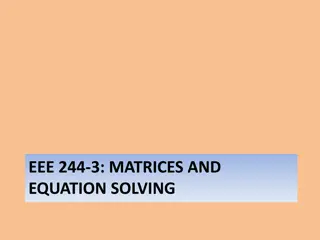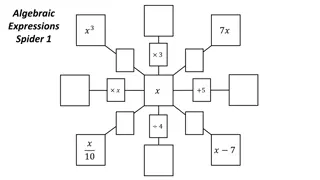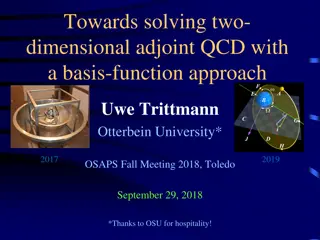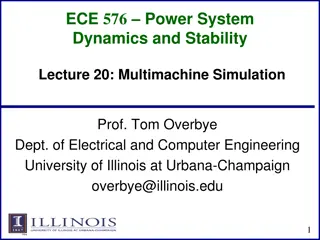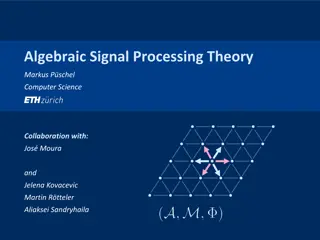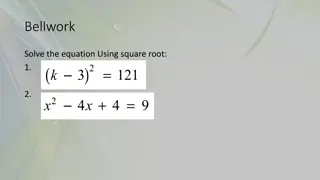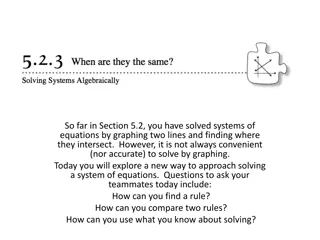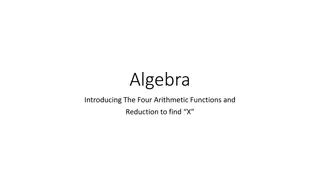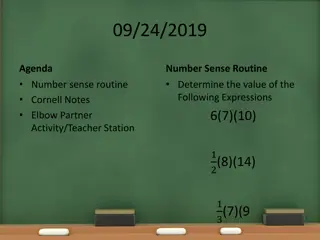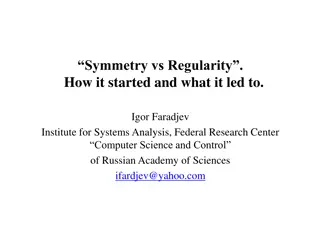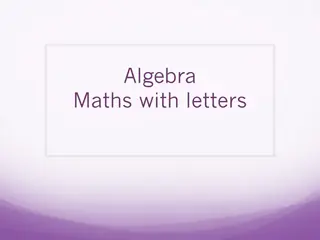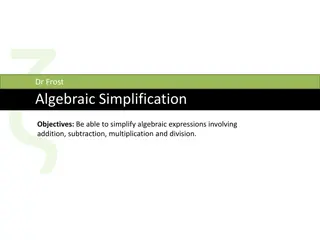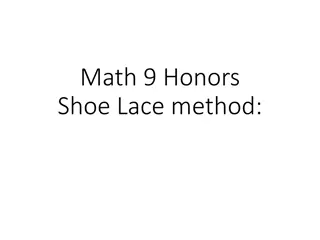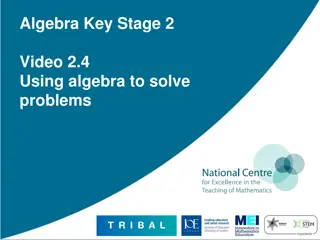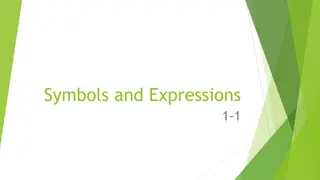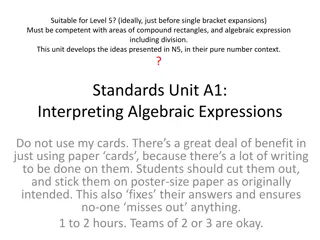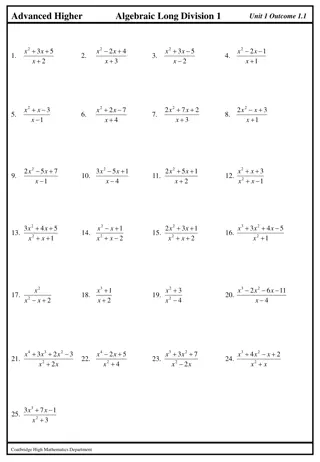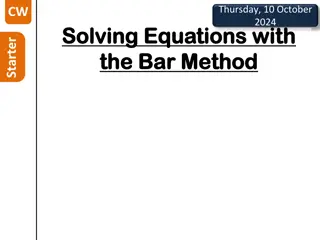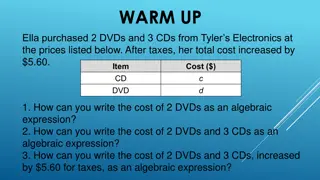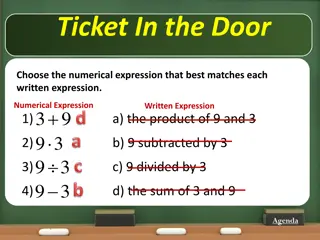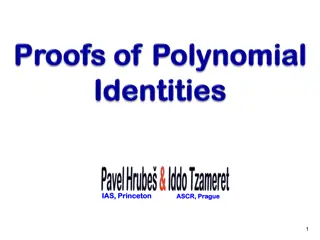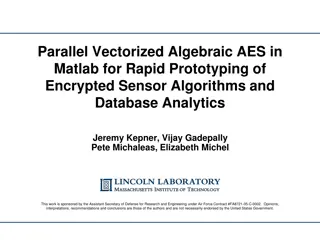Mastering Algebraic Expressions and Formula Rearrangement
Learn to write algebraic expressions, manipulate formulas, calculate costs based on equations, and change formula subjects efficiently.
0 views • 14 slides
The Simplex Method for Linear Programming
The simplex method is an algebraic procedure used to solve linear programming problems by maximizing or minimizing an objective function subject to certain constraints. This method is essential for dealing with real-life problems involving multiple variables and finding optimal solutions. The proces
0 views • 56 slides
Newton's Method for Solving Equations
Newton's Method, also known as the Newton-Raphson method, is a powerful tool for approximating roots of equations. By iteratively improving initial guesses using tangent lines, this method converges towards accurate solutions. This method plays a crucial role in modern calculators and computers for
0 views • 12 slides
Balancing Chemical Equations Using Algebraic Solving Method
Learn how to balance chemical equations using the algebraic solving method step-by-step by assigning variables to compounds and solving for each variable. This comprehensive guide takes you through the entire process, from assigning variables to simplifying fractions and substituting values back int
1 views • 9 slides
Roots of Equations in Engineering: Methods and Techniques
Roots of equations are values of x where f(x) = 0. This chapter explores various techniques to find roots, such as graphical methods, bisection method, false position method, fixed-point iteration, Newton-Raphson method, and secant method. Graphical techniques provide rough estimates, while numerica
0 views • 13 slides
Numerical Methods and Errors in Computation
Delve into the world of numerical methods through the guidance of Dr. M. Mohamed Surputheen. Explore topics such as solving algebraic and transcendental equations, simultaneous linear algebraic equations, interpolation, numerical integration, and solving ordinary differential equations. Learn about
0 views • 130 slides
Algebraic Expressions: Variables, Coefficients, and Constants
Explore the difference between numeric and algebraic expressions, learn about the components of algebraic expressions - variables, coefficients, and constants. Discover how to identify variables, coefficients, and constants in expressions. Classify algebraic expressions as monomials, binomials, or t
0 views • 20 slides
Algebraic Fractions Simplification Techniques
Explore how to factorize and simplify algebraic fractions using common techniques such as factorization, canceling common factors, and multiplying/dividing fractions. The process involves identifying factors, canceling where possible, and performing operations to simplify expressions. Checkpoints an
0 views • 15 slides
Mastering Algebraic Expressions: Translating Words to Equations
Learn how to translate word phrases into algebraic expressions for addition, subtraction, multiplication, and division. Understand the key phrases associated with each operation to write expressions accurately. Enhance your skills in rewriting algebraic expressions with practical examples and concis
4 views • 17 slides
Simplifying Algebraic Expressions in Pre-Algebra
Simplifying algebraic expressions involves identifying terms, like terms, coefficients, and constant terms. By combining like terms and following basic rules, expressions can be simplified to make solving equations easier for pre-algebra students.
0 views • 18 slides
Power System Stability Lecture: Transient Solutions and Load Models
This lecture delves into transient stability solutions and load models in power systems. It covers the simultaneous implicit method for solving algebraic and differential equations, focusing on the Trapezoidal approach for linear systems. The discussion extends to nonlinear cases, particularly using
1 views • 47 slides
Algebraic Proofs and Equations
Explore algebraic proofs, equations solving techniques, and properties of equality through examples. Learn about the distributive property, temperature conversion, and problem-solving applications in algebra. Enhance your understanding of logic and algebraic reasoning.
0 views • 30 slides
Polynomials and Algebraic Expressions
Dive into the world of algebraic expressions and polynomials, exploring concepts like constants, variables, coefficients, and degrees. Learn how to identify terms, understand polynomial types based on degrees, and solve related mathematical problems.
0 views • 12 slides
Polynomials in Mathematics
Explore the concept of polynomials in mathematics, including the geometrical meaning of zeroes, the relationship between zeroes and coefficients, and the division algorithm. Learn about the degree of polynomials, value of polynomials, and how to identify and factorize them. Discover algebraic expres
1 views • 46 slides
Algebraic Expressions and Exponents
Master the basics of algebraic expressions, simplification, and exponent rules in this lesson. Learn to interpret word problems into algebraic expressions, apply properties of real numbers, and solve algebraic problems step by step. Practice evaluating expressions, simplifying equations, and underst
1 views • 13 slides
Matrices and Solving Equations in Electrical Engineering
Matrices play a crucial role in solving linear equations in Electrical Engineering applications. Learn about matrix structures, special matrices, inverses, transposes, system of linear equations, and solving methods using MATLAB/Python. Explore the application of matrices in solving voltage-current
2 views • 24 slides
Algebraic Expressions Spider - Practice and Answers
Engage in solving algebraic expression puzzles with the Algebraic Expressions Spider series. Challenge yourself with varying levels of difficulty and check your solutions against the provided answers. Enhance your algebraic skills while having fun with these interactive exercises.
0 views • 10 slides
Algebraic Solutions for Two-Dimensional Adjoint QCD
Two-dimensional adjoint QCD is explored with a basis-function approach aiming to achieve single-particle states over cluttered multi-particle states. The algebraic solution involves t'Hooft-like integral equations and pseudo-cyclicity considerations to address parton number violation and boundary co
0 views • 22 slides
Power System Dynamics and Stability: Multimachine Simulation with Implicit Methods
This lecture covers the use of simultaneous implicit and nonlinear trapezoidal methods for solving power system dynamics and stability in multimachine simulations. Techniques such as Newton's method for resolving algebraic equations alongside differential equations are discussed, offering numerical
0 views • 28 slides
Carnegie Mellon Algebraic Signal Processing Theory Overview
Carnegie Mellon University is at the forefront of Algebraic Signal Processing Theory, focusing on linear signal processing in the discrete domain. Their research covers concepts such as z-transform, C-transform, Fourier transform, and various signal models and filters. The key concept lies in the al
2 views • 40 slides
Fun Algebraic Thinking Activities for Learning
Engage in a series of interactive algebraic thinking activities to enhance your problem-solving skills. From true or false equations to solving open sentences, these sponge activities will challenge and strengthen your mathematical reasoning abilities. Explore different identities and test your know
0 views • 27 slides
Algebraic Equations and Quadratic Functions Exploration
Explore the world of algebraic equations and quadratic functions through visual aids and interactive activities. Learn to solve equations using square roots, complete the square, write functions in vertex form, and work with algebra tiles to visualize mathematical concepts. Discover the relationship
0 views • 22 slides
New Approaches to Solving Systems of Equations
Explore solving systems of equations algebraically using rules, equations, and mathematical concepts rather than graphing. Understand how to find a rule, compare rules, and use algebraic methods to find solutions. Practice with scenarios like determining when two animals will weigh the same or predi
0 views • 9 slides
Mastering Algebraic Manipulation: Simplifying and Solving Equations
Understanding the fundamental concepts of algebraic manipulation, including the four arithmetic functions and reduction techniques to find unknown variables like x and y. Learn how to isolate variables by applying arithmetic operations step by step, even in more complex expressions, by following spe
1 views • 8 slides
Strong List Coloring and the Polynomial Method in Graph Theory
Exploring the Polynomial Method in the context of Strong List Coloring, Group Connectivity, and Algebraic tools. This method involves proper coloring of graphs based on polynomial assignments, highlighting the significance of Strong Choosability and the Co-graphic case. The applications and proofs a
0 views • 34 slides
Algebraic Expressions Lesson Overview
This lesson focuses on writing and reading algebraic and written expressions with grouping symbols and less than. Students will learn how to translate expressions containing groupings and less than. The lesson is designed to build on the previous day's lesson and challenge students' thinking. It set
0 views • 25 slides
Enhancing Problem-Solving Skills in Mathematics Workshops
In this workshop focused on problem-solving in mathematics, participants engage in various tasks and activities to develop a deep understanding of problem-solving strategies. The key messages emphasize the importance of integrating problem-solving into daily mathematics learning, utilizing multiple
0 views • 34 slides
Symmetry vs. Regularity: Origins of Algebraic Combinatorics
Igor Faradjev recounts the origin of algebraic combinatorics in the 1968-1990 period at the Institute for Systems Analysis. He reflects on his personal experiences, relationships with key mathematicians, and the innovative work undertaken in the Mathematical Laboratory of the Institute for Theoretic
0 views • 49 slides
Algebraic Expressions: From Words to Equations
Explore the world of algebra through letters and expressions. Learn to translate words into mathematical equations, solve for variables, and manipulate algebraic expressions. From adding and subtracting paperclips to mastering BIDMAS, this lesson will deepen your understanding of algebra concepts.
0 views • 21 slides
Simplifying Algebraic Expressions with Dr. Frost
Master algebraic simplification with Dr. Frost's engaging exercises and explanations. Understand like terms, multiplying variables, and more through visual aids and activities. Learn the rules for combining terms and avoid common errors. Enhance your algebra skills and confidence in no time!
0 views • 22 slides
Shoe Lace Method for Finding Polygon Areas
The Shoe Lace Method is a mathematical process used to determine the area of any polygon by employing coordinate geometry. By following specific steps, including organizing coordinates, multiplying diagonally, and adding columns in a certain manner, the method allows for a straightforward calculatio
0 views • 8 slides
Solving Algebra Problems: Finding Values of Fruits
Consider a problem where the number of pears, lemons, and oranges are given with specific relationships between them. By applying algebraic reasoning and solving equations with two unknowns, you can determine the values of the fruits. This engaging exercise aligns with the new curriculum's focus on
0 views • 4 slides
Algebraic Expressions and Operations
Introduction to algebraic expressions, variables, order of operations, and evaluating expressions. Learn about natural numbers, whole numbers, and rational numbers. Examples and explanations provided to help you grasp essential concepts in algebra.
0 views • 7 slides
Developing Algebraic Expressions: Level 5 Mastery Unit
Explore the concepts of compound rectangles, algebraic expressions, and division at a Level 5 standard just before single bracket expansions. This unit focuses on interpreting algebraic expressions through hands-on activities involving cutting out and arranging cards on large posters. Students work
0 views • 30 slides
Advanced Higher Algebraic Long Division Unit 1
This content covers advanced higher algebraic long division for Unit 1, including outcomes, answers, remainders, factors, and solutions. It also delves into partial fractions with distinct linear factors, providing examples and solutions to various algebraic problems.
0 views • 16 slides
Solving Equations with the Bar Method - Practice Problems and Solutions
Practice solving one-step, two-step, and balancing equations using the bar method with a series of interactive examples. Enhance your understanding of algebraic concepts through visual representation and step-by-step solutions.
0 views • 31 slides
Algebraic Expressions: Terms, Factors, and Coefficients
When dealing with algebraic expressions, it's essential to grasp terms, factors, and coefficients. Expressions consist of numbers, operations, and variables, with terms being the building blocks separated by addition or subtraction signs. Factors are the components of each term that produce the give
0 views • 13 slides
Math Expressions Exploration for Elementary Students
This content discusses numerical and algebraic expressions, teaching students how to match written expressions to numerical expressions, understand the concept of variables, and differentiate between algebraic and numerical expressions. It also covers basic operations like addition, subtraction, mul
0 views • 11 slides
Algebraic Complexity and Equational Proofs in Arithmetic Formulas
Explore the intricacies of polynomial identity testing (PIT), equational proofs, and arithmetic formulas in the context of algebraic complexity. Learn about the minimal number of operations needed to compute the zero polynomial and derive new identities using derivation rules and axioms in polynomia
0 views • 39 slides
Parallel Vectorized Algebraic AES in Matlab for Rapid Prototyping
Implementing a Parallel Vectorized Algebraic AES in Matlab for efficient prototyping of encrypted sensor algorithms and database analytics, sponsored by the Assistant Secretary of Defense. This work focuses on the Internet-of-Things challenges, architectures, defense challenges, and current defense
0 views • 24 slides
